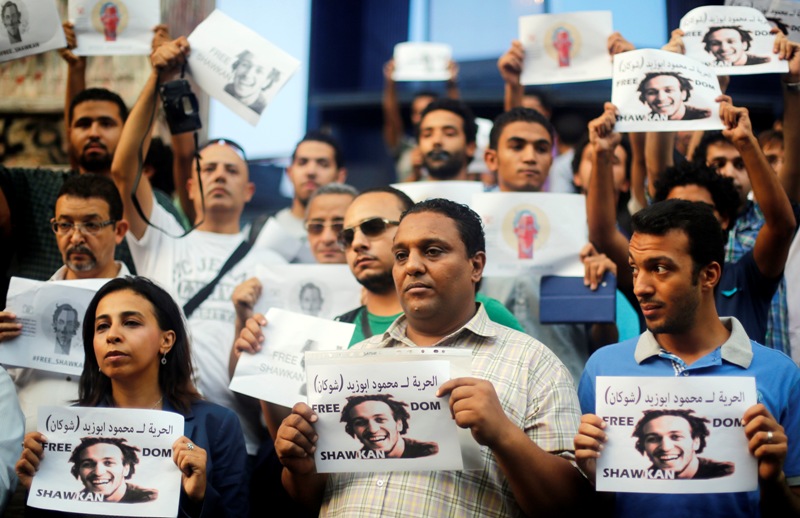The International Press Institute (IPI) said today that it was increasingly concerned for the well-being of imprisoned Egyptian freelance photojournalist Mahmoud Abou Zeid and called on Egypt to release him without delay.
Abou Zeid, also known as “Shawkan”, has been held without official charges since Aug. 14, 2013, when he was arrested while covering a sit-in held at Cairo’s Rabaa Al-Adawiya square to protest the forced removal of former Egyptian President Mohamed Morsi.
According to his own account, Abou Zeid has been subject to severe physical abuse and deprivation at the hands of security forces and officers at Tora Prison, which he has described in chilling terms as a “cemetery”. A former contributor to Western media outlets through freelance work with the Demotix photo agency, Abou Zeid is now in “failing” health, family and friends say. Prison officials have denied him access to medication for hepatitis C, as well as to clothing and food provided by family members, a close family friend who is leading a campaign for Abou Zeid’s release, said in a phone interview with IPI this week.
Mohamed Abou Zeid, Shawkan’s brother, told IPI by telephone today that he had last visited his brother yesterday, July 30, and described the state of his health as “very bad” and having deteriorated over the past few months.
Egyptian courts have repeatedly extended Abou Zeid’s pre-trial detention and the journalist did not appear before a judge until May 2015. All of Abou Zeid’s hearings have taken place without the presence of his lawyer, who was only allowed to visit his client for the first time last month, according to Mohamed Abou Zeid.
Abou Zeid’s most recent hearing, scheduled for July 21, was reportedly postponed until Monday, August 3, coincidentally coinciding with a visit to Egypt by United States Secretary of State John Kerry.
IPI Director of Press Freedom Programmes Scott Griffen said IPI and its membership were “horrified” by the treatment of Abou Zeid.
“We are deeply disturbed at the extent to which Mahmoud Abou Zeid’s basic human rights have been grossly and continually violated by the Egyptian authorities,” Griffen commented. “He has been arbitrarily detained for over 700 days and held in degrading conditions simply for doing his work as a photojournalist. He must be released immediately and provided with urgent medical attention.”
With the world’s attention focused on the sham trial of several Al Jazeera journalists in Egypt on charges of spreading false news and aiding the now-banned Muslim Brotherhood, Griffen also urged foreign governments not to forget the plight of Mahmoud Abou Zeid and other imprisoned Egyptian journalists whose stories have not received the same degree of media coverage.
“All foreign governments that are concerned about freedom of expression and the press in Egypt should also be pressing the Egyptian authorities to release Mahmoud Abou Zeid and others like him,” Griffen said. “Every case of a journalist imprisoned in Egypt is unacceptable.”
A verdict had been expected in the Al Jazeera trial yesterday, but was postponed until at least Aug. 2. IPI this week said the verdict would provide a test of Egypt’s commitment to human rights.
According to his own account in a letter distributed earlier this year (a photograph of the original of which was provided to IPI by a close family friend), Mahmoud Abou Zeid was detained in a dragnet-style operation on the morning of Aug. 14, 2013. Despite identifying himself as a journalist, he was taken into custody together with an American and a French reporter, both of whom were released hours later. Although arrested and held without official charges, Abou Zeid reportedly faces an array of accusations – including illegal firearm possession, murder and membership in an illegal group – that are said to have been levied indiscriminately against those picked up in the dragnet.
Egyptian authorities have ignored documentation testifying to Abou Zeid’s identity as a professional journalist, including a confirmation from the photo agency Demotix that Abou Zeid had been on assignment for the agency on Aug. 14, 2013.
Amnesty International has labelled Mahmoud Abou Zeid a prisoner of conscience.
